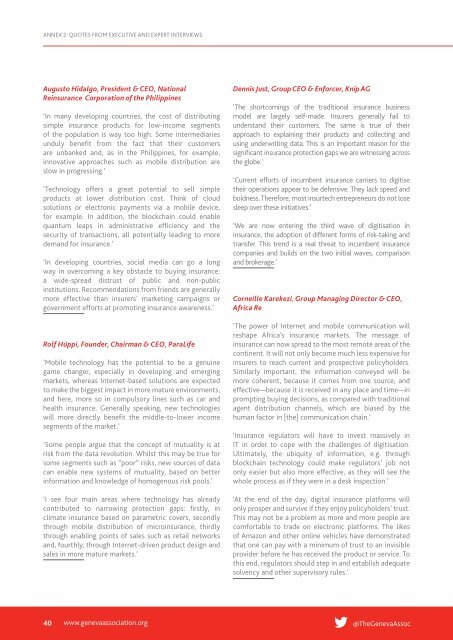Harnessing Technology to Narrow the Insurance Protection Gap
harnessing-technology-to-narrow-the-insurance-protection-gap
harnessing-technology-to-narrow-the-insurance-protection-gap
You also want an ePaper? Increase the reach of your titles
YUMPU automatically turns print PDFs into web optimized ePapers that Google loves.
ANNEX 2: QUOTES FROM EXECUTIVE AND EXPERT INTERVIEWS<br />
Augus<strong>to</strong> Hidalgo, President & CEO, National<br />
Reinsurance Corporation of <strong>the</strong> Philippines<br />
‘In many developing countries, <strong>the</strong> cost of distributing<br />
simple insurance products for low-income segments<br />
of <strong>the</strong> population is way <strong>to</strong>o high. Some intermediaries<br />
unduly benefit from <strong>the</strong> fact that <strong>the</strong>ir cus<strong>to</strong>mers<br />
are unbanked and, as in <strong>the</strong> Philippines, for example,<br />
innovative approaches such as mobile distribution are<br />
slow in progressing.’<br />
‘<strong>Technology</strong> offers a great potential <strong>to</strong> sell simple<br />
products at lower distribution cost. Think of cloud<br />
solutions or electronic payments via a mobile device,<br />
for example. In addition, <strong>the</strong> blockchain could enable<br />
quantum leaps in administrative efficiency and <strong>the</strong><br />
security of transactions, all potentially leading <strong>to</strong> more<br />
demand for insurance.’<br />
‘In developing countries, social media can go a long<br />
way in overcoming a key obstacle <strong>to</strong> buying insurance:<br />
a wide-spread distrust of public and non-public<br />
institutions. Recommendations from friends are generally<br />
more effective than insurers’ marketing campaigns or<br />
government efforts at promoting insurance awareness.’<br />
Rolf Hüppi, Founder, Chairman & CEO, ParaLife<br />
‘Mobile technology has <strong>the</strong> potential <strong>to</strong> be a genuine<br />
game changer, especially in developing and emerging<br />
markets, whereas Internet-based solutions are expected<br />
<strong>to</strong> make <strong>the</strong> biggest impact in more mature environments,<br />
and here, more so in compulsory lines such as car and<br />
health insurance. Generally speaking, new technologies<br />
will more directly benefit <strong>the</strong> middle-<strong>to</strong>-lower income<br />
segments of <strong>the</strong> market.’<br />
‘Some people argue that <strong>the</strong> concept of mutuality is at<br />
risk from <strong>the</strong> data revolution. Whilst this may be true for<br />
some segments such as “poor” risks, new sources of data<br />
can enable new systems of mutuality, based on better<br />
information and knowledge of homogenous risk pools.’<br />
‘I see four main areas where technology has already<br />
contributed <strong>to</strong> narrowing protection gaps: firstly, in<br />
climate insurance based on parametric covers, secondly<br />
through mobile distribution of microinsurance, thirdly<br />
through enabling points of sales such as retail networks<br />
and, fourthly, through Internet-driven product design and<br />
sales in more mature markets.’<br />
Dennis Just, Group CEO & Enforcer, Knip AG<br />
‘The shortcomings of <strong>the</strong> traditional insurance business<br />
model are largely self-made. Insurers generally fail <strong>to</strong><br />
understand <strong>the</strong>ir cus<strong>to</strong>mers. The same is true of <strong>the</strong>ir<br />
approach <strong>to</strong> explaining <strong>the</strong>ir products and collecting and<br />
using underwriting data. This is an important reason for <strong>the</strong><br />
significant insurance protection gaps we are witnessing across<br />
<strong>the</strong> globe.’<br />
‘Current efforts of incumbent insurance carriers <strong>to</strong> digitise<br />
<strong>the</strong>ir operations appear <strong>to</strong> be defensive. They lack speed and<br />
boldness. Therefore, most insurtech entrepreneurs do not lose<br />
sleep over <strong>the</strong>se initiatives.’<br />
‘We are now entering <strong>the</strong> third wave of digitisation in<br />
insurance, <strong>the</strong> adoption of different forms of risk-taking and<br />
transfer. This trend is a real threat <strong>to</strong> incumbent insurance<br />
companies and builds on <strong>the</strong> two initial waves, comparison<br />
and brokerage.’<br />
Corneille Karekezi, Group Managing Direc<strong>to</strong>r & CEO,<br />
Africa Re<br />
‘The power of Internet and mobile communication will<br />
reshape Africa’s insurance markets. The message of<br />
insurance can now spread <strong>to</strong> <strong>the</strong> most remote areas of <strong>the</strong><br />
continent. It will not only become much less expensive for<br />
insurers <strong>to</strong> reach current and prospective policyholders.<br />
Similarly important, <strong>the</strong> information conveyed will be<br />
more coherent, because it comes from one source, and<br />
effective—because it is received in any place and time—in<br />
prompting buying decisions, as compared with traditional<br />
agent distribution channels, which are biased by <strong>the</strong><br />
human fac<strong>to</strong>r in [<strong>the</strong>] communication chain.’<br />
‘<strong>Insurance</strong> regula<strong>to</strong>rs will have <strong>to</strong> invest massively in<br />
IT in order <strong>to</strong> cope with <strong>the</strong> challenges of digitisation.<br />
Ultimately, <strong>the</strong> ubiquity of information, e.g. through<br />
blockchain technology could make regula<strong>to</strong>rs’ job not<br />
only easier but also more effective, as <strong>the</strong>y will see <strong>the</strong><br />
whole process as if <strong>the</strong>y were in a desk inspection.’<br />
‘At <strong>the</strong> end of <strong>the</strong> day, digital insurance platforms will<br />
only prosper and survive if <strong>the</strong>y enjoy policyholders’ trust.<br />
This may not be a problem as more and more people are<br />
comfortable <strong>to</strong> trade on electronic platforms. The likes<br />
of Amazon and o<strong>the</strong>r online vehicles have demonstrated<br />
that one can pay with a minimum of trust <strong>to</strong> an invisible<br />
provider before he has received <strong>the</strong> product or service. To<br />
this end, regula<strong>to</strong>rs should step in and establish adequate<br />
solvency and o<strong>the</strong>r supervisory rules.’<br />
40 www.genevaassociation.org @TheGenevaAssoc


